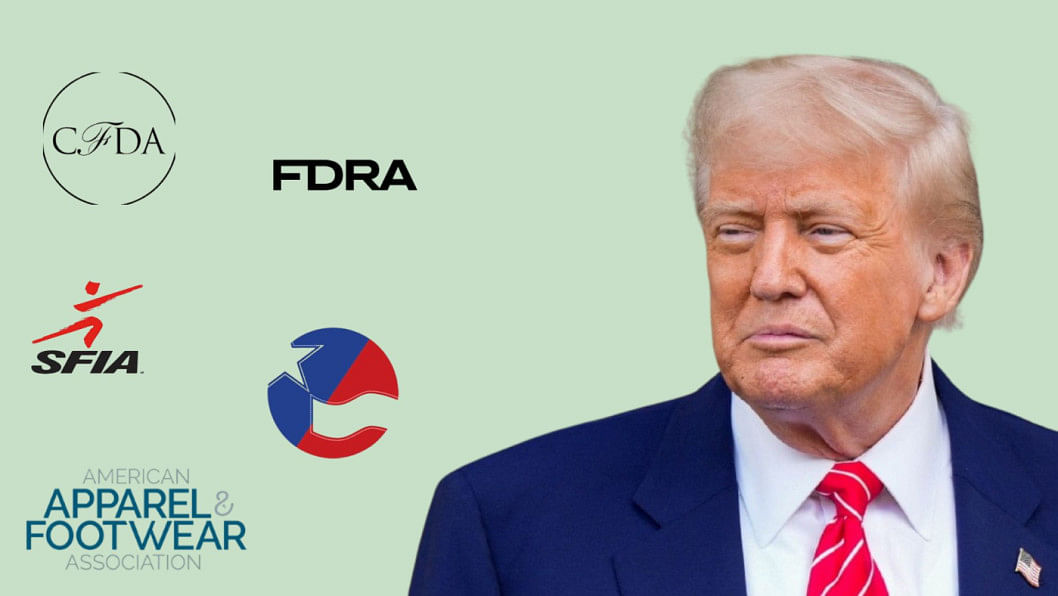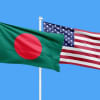Major US trade bodies welcome Trump’s hint at tariff relief for apparel, footwear

Five major American trade bodies have appreciated the recent comments by US President Donald Trump on his tariff plan, which indicate that footwear and apparel items may be exempted from higher tariffs.
The American Apparel & Footwear Association (AAFA), the Council of Fashion Designers of America (CFDA), the Footwear Distributors and Retailers of America (FDRA), the Sports and Fitness Industry Association (SFIA), and the United States Fashion Industry Association (USFIA) sent a joint letter to Trump on May 29.
Speaking to reporters before boarding Air Force One in New Jersey, Trump said he agreed with comments from Treasury Secretary Scott Bessent on April 29 that the US does not necessarily need a "booming textile industry" — remarks that drew criticism from the National Council of Textile Organizations, Reuters reported.
"We're not looking to make sneakers and T-shirts. We want to make military equipment. We want to make big things. We want to do the AI thing," Trump said.
"I'm not looking to make T-shirts, to be honest. I'm not looking to make socks. We can do that very well in other locations. We are looking to do chips and computers and lots of other things — and tanks and ships," Reuters quoted Trump as saying.
"Thank you for your recent comments indicating that your tariff policy is not focused on driving sneaker and T-shirt production to the US You are absolutely right," the letter read.
"We agree that tariff policy cannot scale up a domestic footwear and apparel industry. We appreciate your acknowledgment of the real-world challenges our industries face."
"We urge you to adopt a pragmatic framework that reduces the tariff burden on footwear and apparel, increases high-value jobs for US workers, and provides relief to hardworking American families," the joint letter said.
The letter also noted that footwear and apparel manufacturing are both labour- and capital-intensive.
Shoemaking requires a large, skilled workforce dedicated to mastering intricate techniques — it still takes nearly 100 individual steps to produce a basic pair of leather dress shoes.
Additionally, there are very few sourcing locations capable of meeting the scale and cost demands of US consumers, and establishing footwear and apparel factories requires years of planning and investment.
For decades, the footwear and apparel industries have operated under a substantial tariff burden — the highest of any sector.
While the average tariff rate on consumer goods is just over 2 percent, average apparel and footwear tariff rates exceed 14.5 and 12 percent, respectively, before any new tariffs are added.
Children's shoes often face rates of 20 percent, 48 percent, or higher, while many back-to-school clothing items carry a baseline 32 percent tariff.
These costs ultimately fall on American families, limiting their ability to participate in essential activities such as work, recreation, sports, and fitness — all of which support mentally and physically healthier Americans and help boost the US economy.
Any new tariffs should recognize that these industries already exceed the baselines the administration has proposed and should not be stacked on top of already elevated rates, as this only increases the cost burden on those US consumers who can afford it the least.
As much as the members would love to manufacture more footwear and apparel in the US, closer to their consumers, it is simply not feasible to do so at scale right now due to significant supply chain, labour, and cost constraints.
Tariff policy cannot overcome these obstacles, especially when it imposes new costs on existing manufacturers in the industry.
"We appreciate your recognition of the need to deliver high-value, good-paying jobs to American workers," the trade bodies also said in the letter.
"As an industry that already directly supports more than 3.5 million high-value US jobs as we design, craft, and deliver responsible, affordable, and authentic fashion to US consumers, we stand ready to help."

 For all latest news, follow The Daily Star's Google News channel.
For all latest news, follow The Daily Star's Google News channel. 








Comments